2016 Public Health Ethics Forum Speakers and Planning Committee Members
Making Latino/Hispanic Health Count: Advancing a Public Health Ethics Framework on Data Collection for Social Justice
Carmen Villar, MSW
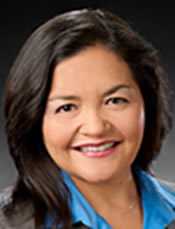 Chief of Staff, Centers for Disease Control and Prevention (CDC)
Chief of Staff, Centers for Disease Control and Prevention (CDC)
Carmen Villar is Chief of Staff for the Centers for Disease Control and Prevention (CDC), where she provides strategic and analytical support across a range of cross-cutting portfolios, including global health, infectious diseases, public health preparedness and response, and non-communicable disease prevention. She also facilitates strategic partnerships with key public health agencies and international organizations.
Before becoming Chief of Staff, Carmen Villar worked both in Nigeria and Zambia, providing leadership and oversight to CDC’s programs as part of the Presidents Emergency Plan for AIDS Relief (PEPFAR). She worked with Ministries of Health, NGOs and the U.S. interagency team to ensure delivery of treatment, care, and support services for people affected by HIV/AIDS. As a key health advisor to the U.S. Ambassadors in Nigeria and Zambia, she also provided expert advice in critical public health areas such as polio and tuberculosis, while overseeing program budgets of hundreds of millions of dollars. Program.
Carmen has had a distinguished career at CDC. She started as Presidential Management Intern focusing on policy and program planning for HIV, STD, and TB prevention. She has worked closely with state and local health departments to implement public health preparedness and HIB prevention programs. Carmen has also overseen multi-site domestic and international HIV research in the areas of drug use, prevention of mother to child treatment, and vaccines.
Carmen holds a Master in Social Welfare, concentration in health, from the University of California at Berkeley and a Bachelors in Anthropology from UC Berkeley.
Leandris Liburd, PhD, MPH, MA
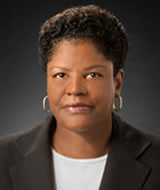 Associate Director for Minority Health and Health Equity,
Associate Director for Minority Health and Health Equity,
Office of Minority Health & Health Equity, Centers for Disease Control and Prevention (CDC)
Dr. Leandris Liburd is the Director of the Office of Minority Health and Health Equity at the Centers for Disease Control and Prevention (CDC). In this role, she oversees the work of CDC’s Office of Women’s Health, Diversity and Inclusion Management, and Minority Health and Health Equity. In addition, she provides agency leadership, direction, and accountability for CDC’s policies and programs to ensure they are effective in improving women’s and minority health. She also serves as the agency’s principal advisor on health equity issues with the Department of Health and Human Services, other federal agencies, national organizations, academic institutions, and the public.
Dr. Liburd is a respected public health leader who has over the course of her career championed community health promotion, chronic disease prevention, community engagement, eliminating health disparities, and addressing the social determinants of health. She has worked in public health at the local, state, and federal levels, and has held a variety of leadership positions at CDC since joining the agency in 1987.
Dr. Liburd has published extensively on community-based public health approaches to chronic disease prevention and control, the influence of culture and gender on health beliefs and behaviors, and racial and ethnic health disparities. In 2010, she published her first edited volume Diabetes and Health Disparities: Community-Based Approaches for Racial and Ethnic Populations which serves as a key resource for those interested in socio-ecological approaches to reducing diabetes disparities.
Dr. Liburd holds a Bachelor of Arts degree from the University of Michigan at Ann Arbor, a Master of Public Health in health education from the University of North Carolina at Chapel Hill, and a Master of Arts in cultural anthropology and a Doctor of Philosophy degree in medical anthropology from Emory University.
Rueben C. Warren, DDS, MPH, DrPH, MDiv
 Dr. Warren is Professor & Director of the National Center for Bioethics In Research and Health Care at Tuskegee University, as well as the Adjunct Professor of Public Health, Medicine and Ethics & Director of the Institute for Faith-Health Leadership at the Interdenominational Theological Center in Atlanta, Georgia. From 1988 to 1997, Dr. Warren served as Associate Director for Minority Health at the Centers for Disease Control and Prevention (CDC). During the years 1997 to 2004, he was Associate Director for Urban Affairs at the agency for Toxic Substances and Disease Registry (ATSDR) and 2005 to 2009 he was Associate Director for Environmental Justice CDC/ATSDR. He was the Director of Infrastructure Development for the National Institute on Minority Health and Health Disparities within the National Institutes of Health in Bethesda, MD from 2005 to 2007. Prior to joining CDC, Dr. Warren served as Dean and Associate Professor of the School of Dentistry, Department of Preventive Dentistry and Community Health, at Meharry Medical College in Nashville, Tennessee.
Dr. Warren is Professor & Director of the National Center for Bioethics In Research and Health Care at Tuskegee University, as well as the Adjunct Professor of Public Health, Medicine and Ethics & Director of the Institute for Faith-Health Leadership at the Interdenominational Theological Center in Atlanta, Georgia. From 1988 to 1997, Dr. Warren served as Associate Director for Minority Health at the Centers for Disease Control and Prevention (CDC). During the years 1997 to 2004, he was Associate Director for Urban Affairs at the agency for Toxic Substances and Disease Registry (ATSDR) and 2005 to 2009 he was Associate Director for Environmental Justice CDC/ATSDR. He was the Director of Infrastructure Development for the National Institute on Minority Health and Health Disparities within the National Institutes of Health in Bethesda, MD from 2005 to 2007. Prior to joining CDC, Dr. Warren served as Dean and Associate Professor of the School of Dentistry, Department of Preventive Dentistry and Community Health, at Meharry Medical College in Nashville, Tennessee.
Currently, Dr. Warren is also a Clinical Professor, Department of Community Health/Preventive Medicine, Morehouse School of Medicine, Adjunct Professor, Department of Behavioral Sciences and Health Education, Rollins School of Public Health, Emory University, both in Atlanta, Georgia and Adjunct Professor in the School of Dentistry and School of Graduate Studies at Meharry Medical College in Nashville, Tennessee.
His extensive public health experience at community, state, local, national, and international levels range from clinical and research work in the Lagos University Teaching Hospital in Lagos, Nigeria, to heading the Public Health Dentistry Program at the Mississippi State Department of Health.
Cesar D. Fermin, PhD
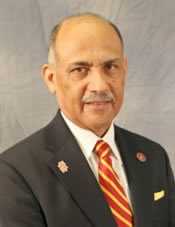 Dr. Fermin is known internationally for high resolution transmission electron microscopy of nature’s nanoparticles (otoconia biological crystals), a skill that he applied to an extensive list of publications. Dr. Fermin has a broad background/knowledge of biological systems, neural plasticity, pathology, and the vestibular system. Dr. Fermin held dozens of private and federally funded projects, is the author of hundreds of peer-reviewed publications, and served as a grant reviewer for National Institute of Deafness and other Communication Disorders. He serves in the editorial board of several peer-review journals, is a member of several medical school advisory boards, and is the international medical/scientific advisor for UTESA (13 campuses) in the Dominican Republic where he also works with the Ministry of Higher Education Science & Technology bringing funded MS/PhD students to Tuskegee University.
Dr. Fermin is known internationally for high resolution transmission electron microscopy of nature’s nanoparticles (otoconia biological crystals), a skill that he applied to an extensive list of publications. Dr. Fermin has a broad background/knowledge of biological systems, neural plasticity, pathology, and the vestibular system. Dr. Fermin held dozens of private and federally funded projects, is the author of hundreds of peer-reviewed publications, and served as a grant reviewer for National Institute of Deafness and other Communication Disorders. He serves in the editorial board of several peer-review journals, is a member of several medical school advisory boards, and is the international medical/scientific advisor for UTESA (13 campuses) in the Dominican Republic where he also works with the Ministry of Higher Education Science & Technology bringing funded MS/PhD students to Tuskegee University.
Dr. Fermin was born in the Dominican Republic where he obtained a BS at UNPHU in Science-Education. He studied English at Florida Institute of Technology where he also earned an MS in Cell Biology and a PhD in Biology. He then completed by a post-doctoral fellowship at Baylor College of Medicine in Houston, Texas where he later served as an Assistant Professor. He was tenured at Tulane Medical School and then moved to Tuskegee University as Associate Dean in the College of Vet. Med. Nursing Allied Health, as Graduate Studies Research Dean, and since 2014 as Provost VP for Academic Affairs
Eliseo J. Pérez-Stable, MD
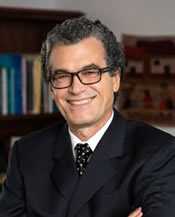 Director, National Institute on Minority Health and Health Disparities (NIMHD), National Institutes of Health (NIH)
Director, National Institute on Minority Health and Health Disparities (NIMHD), National Institutes of Health (NIH)
Dr. Pérez-Stable oversees the Institute’s $281 million budget to conduct and support research, training, research capacity and infrastructure development, public education, and information dissemination programs to improve minority health and reduce health disparities. NIMHD is the lead organization at NIH for planning, reviewing, coordinating, and evaluating minority health and health disparities research activities conducted by NIH Institutes and Centers.
Dr. Pérez-Stable’s expertise spans a broad range of health disparities disciplines. His research interests have centered on improving the health of racial and ethnic minorities and underserved populations, advancing patient-centered care, improving cross-cultural communication skills among health care professionals, and promoting diversity in the biomedical research workforce. Recognized as a leader in Latino health care and disparities research, Dr. Pérez-Stable has spent more than 30 years leading research on smoking cessation and tobacco control policy in Latino populations in the United States and Latin America.
Prior to becoming NIMHD Director, Dr. Pérez-Stable was a professor of medicine and chief of the Division of General Internal Medicine, at the University of California, San Francisco (UCSF). He was also director of the UCSF Center for Aging in Diverse Communities, which is funded by NIH’s National Institute on Aging and director of the UCSF Medical Effectiveness Research Center for Diverse Populations, which addresses issues for African Americans, Asians, and Latinos in the areas of cancer, cardiovascular disease, aging, and reproductive health.
Dr. Pérez-Stable was elected to the National Academy of Medicine (formerly Institute of Medicine) of the National Academy of Science in 2001. Dr. Pérez-Stable earned his B.A. in chemistry from the University of Miami and his M.D. from the University of Miami School of Medicine. He completed his primary care internal medicine residency and research fellowship at UCSF.
Carla Saenz, PhD
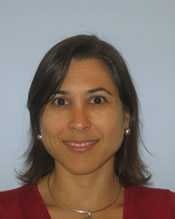 Carla is in charge of the Regional Bioethics Program at the Pan American Health Organization (PAHO), which is the World Health Organization’s Regional Office for the Americas. She holds a PhD in Philosophy from the University of Texas at Austin. Prior to joining PAHO she served as a postdoctoral fellow and guest researcher at the Department of Bioethics at the Clinical Center of the National Institutes of Health, where her research focused on population-based bioethics, and as a Professor at the University of North Carolina at Chapel Hill.
Carla is in charge of the Regional Bioethics Program at the Pan American Health Organization (PAHO), which is the World Health Organization’s Regional Office for the Americas. She holds a PhD in Philosophy from the University of Texas at Austin. Prior to joining PAHO she served as a postdoctoral fellow and guest researcher at the Department of Bioethics at the Clinical Center of the National Institutes of Health, where her research focused on population-based bioethics, and as a Professor at the University of North Carolina at Chapel Hill.
PAHO’s Regional Program on Bioethics was established in 1993 to provides technical cooperation on bioethics to the countries in the Americas. Its main areas of work are research ethics and public health ethics. It houses PAHO Ethics Review Committee, which reviews all studies conducted with PAHO’s involvement in the region.
Ken Dominguez, MD, MPH, CAPT USPHS
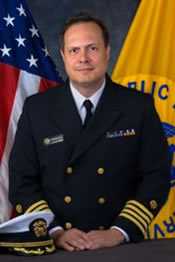 Medical Epidemiologist (CDC)
Medical Epidemiologist (CDC)
National expert on HIV in pregnant women, infants, children and Latinos
Dr. Dominguez completed a B.A. from Harvard University, and an M.D. /M.P.H. from Columbia University. He also completed residency training in both Pediatrics and Preventive Medicine at Harbor-UCLA Medical Center in Torrance, California and at the CDC in Atlanta, respectively and trained as an Epidemic Intelligence Service (E.I.S.) Officer through CDC at the Puerto Rico Department of Health. In 1991, he became a Commissioned Officer in the U.S. Public Health Service and serves at the rank of Captain. He has worked as a CDC medical epidemiologist in the Division of HIV/AIDS Prevention since 1993 describing the neonatal, pediatric, and adolescent HIV/AIDS epidemic and now works in the area of biomedical interventions to prevent HIV transmission. He serves as CDC co-lead on guidelines related to the prevention and treatment of opportunistic infections in children and adolescents and guidelines for nonoccupational HIV prophylaxis. He is an Advisory Committee member for the Antiretroviral Pregnancy Registry providing information about the risk for congenital birth effects associated with antiretroviral exposure and is a federal liaison to the American Academy of Pediatrics (AAP) Committee on Pediatric AIDS.
He is CDC spokesperson for the One Test-Two Lives HIV testing campaign for pregnant women and their providers, the HIV Treatment Linked to Care (TLC) campaign, and We Can Stop HIV One Conversation at a Time. He mentors junior scientists and student interns through CDC training programs and helps teach the AAP Pediatric HIV course. He co-organized CDC’s first Hispanic/Latino Health Workgroup, a scientific workgroup focused on improving Hispanic health in the U.S. and is currently its co-chairperson. He recently coauthored a CDC Vital Signs article describing the health status of Hispanics in the U.S.
Larissa Avilés-Santa MD, MPH
 Dr. Avilés-Santa joined the National Heart, Lung, and Blood Institute (NHLBI) in 2006. She is an expert on the study and prevention of diabetes and cardiovascular disease in underserved populations, particularly among Hispanic communities. Dr. Avilés-Santa is currently the Project Director for the Hispanic Community Health Study - Study of Latinos (HCHS-SOL), which was initiated on October 1, 2006. HCHS-SOL is the largest study to date to examine the prevalence of common heart disease risk factors—high blood pressure, high cholesterol, obesity, diabetes, and smoking—within a diverse Hispanic/Latino population. HCHS-SOL has enrolled over 16,000 adults of different backgrounds, including Cuban, Dominican, Mexican, Puerto Rican, Central American, and South American.
Dr. Avilés-Santa joined the National Heart, Lung, and Blood Institute (NHLBI) in 2006. She is an expert on the study and prevention of diabetes and cardiovascular disease in underserved populations, particularly among Hispanic communities. Dr. Avilés-Santa is currently the Project Director for the Hispanic Community Health Study - Study of Latinos (HCHS-SOL), which was initiated on October 1, 2006. HCHS-SOL is the largest study to date to examine the prevalence of common heart disease risk factors—high blood pressure, high cholesterol, obesity, diabetes, and smoking—within a diverse Hispanic/Latino population. HCHS-SOL has enrolled over 16,000 adults of different backgrounds, including Cuban, Dominican, Mexican, Puerto Rican, Central American, and South American.
Dr. Avilés-Santa received her M.D. in 1992 from the University of Puerto Rico, School of Medicine. She then completed her residency training in internal medicine at the University Hospital in San Juan in 1995. Following her residency, she moved to Texas to pursue subspecialty training in endocrinology, diabetes, and metabolism at the University of Texas Southwestern Medical Center at Dallas. After finishing her fellowship, Dr. Avilés-Santa joined the faculty of the Endocrine Division at UT Southwestern, during which time she also earned a Master’s in Public Health at the University of Texas School of Public Health. She is board certified in internal medicine and endocrinology.
Alfonso Rodriguez-Lainz, Ph.D., DVM, MPVM
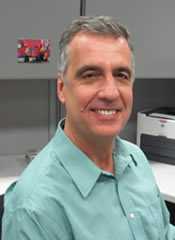 Dr. Rodriguez-Lainz is a senior fellow at the Centers for Disease Control and Prevention (CDC) Division of Global Migration and Quarantine. Dr. Rodriguez’s main responsibilities include acting as a liaison, coordinator, planner and project lead for domestic migrant health activities for the Division, across the CDC, and in collaboration with national and international partners. In that role, he has designed, implemented and analyzed multiple health studies targeting migrant populations in the U.S and Mexico. Prior to joining CDC, Dr. Rodriguez was the senior epidemiologist for the California Office of Binational Border Health, California Department of Public Health. He has extensive experience in coordinating cross-border surveillance and public health projects between California, Mexico and Latin America.
Dr. Rodriguez-Lainz is a senior fellow at the Centers for Disease Control and Prevention (CDC) Division of Global Migration and Quarantine. Dr. Rodriguez’s main responsibilities include acting as a liaison, coordinator, planner and project lead for domestic migrant health activities for the Division, across the CDC, and in collaboration with national and international partners. In that role, he has designed, implemented and analyzed multiple health studies targeting migrant populations in the U.S and Mexico. Prior to joining CDC, Dr. Rodriguez was the senior epidemiologist for the California Office of Binational Border Health, California Department of Public Health. He has extensive experience in coordinating cross-border surveillance and public health projects between California, Mexico and Latin America.
Dr. Rodriguez received his Ph.D. in Epidemiology and Masters in Preventive Veterinary Medicine from the University of California at Davis, and his DVM from the School of Veterinary Medicine in Cordoba, Spain. He has coauthored many peer-reviewed publications and several border and migrant health reports. He also teaches a course on Migration and Global Health at SDSU Graduate School for Public Health.
Glenn Flores, MD, FAAP
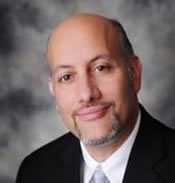 Dr. Flores is Distinguished Chair of Health Policy Research at the Medica Research Institute and a Research Affiliate in the Department of Health Sciences Research at the Mayo Clinic. He graduated magna cum laude from Harvard College, and attended medical school at the University of California, San Francisco, School of Medicine. He is a member of the Council of the American Pediatric Society, the editorial board of Journal of Health Care for the Poor and Underserved, and the National Advisory Committees of the RWJ Amos Medical Faculty Development and Aligning Forces for Quality Programs. He was a member of the US Preventive Services Task Force from 2010-2013. He is Director of the NIDDK/APA Research in Academic Pediatrics Initiative on Diversity (RAPID), whose goal is to provide career development and advancement for diverse junior faculty in general academic pediatrics pursuing careers addressing pediatric obesity, nutrition, and/or sickle cell disease. He has provided two Congressional Briefings, US Senate and Congressional testimony, and a recent DHHS and ACF briefing. He has been a consultant/NAC member for the US Surgeon General, IOM, CDC, NICHD, AMA, NHMA, First Focus, the DHHS Office of Civil Rights, and Sesame Workshop.
Dr. Flores is Distinguished Chair of Health Policy Research at the Medica Research Institute and a Research Affiliate in the Department of Health Sciences Research at the Mayo Clinic. He graduated magna cum laude from Harvard College, and attended medical school at the University of California, San Francisco, School of Medicine. He is a member of the Council of the American Pediatric Society, the editorial board of Journal of Health Care for the Poor and Underserved, and the National Advisory Committees of the RWJ Amos Medical Faculty Development and Aligning Forces for Quality Programs. He was a member of the US Preventive Services Task Force from 2010-2013. He is Director of the NIDDK/APA Research in Academic Pediatrics Initiative on Diversity (RAPID), whose goal is to provide career development and advancement for diverse junior faculty in general academic pediatrics pursuing careers addressing pediatric obesity, nutrition, and/or sickle cell disease. He has provided two Congressional Briefings, US Senate and Congressional testimony, and a recent DHHS and ACF briefing. He has been a consultant/NAC member for the US Surgeon General, IOM, CDC, NICHD, AMA, NHMA, First Focus, the DHHS Office of Civil Rights, and Sesame Workshop.
He received the 2006 AAP Outstanding Achievement Award in the Application of Epidemiologic Information to Child Health Advocacy, the 2006 NHMA Health Leadership Award, the 2008 Millie and Richard Brock Award for Distinguished Contributions to Pediatrics, the 2010 Helen Rodríguez-Trías Social Justice Award from the APHA, and the 2012 Research Award from the Academic Pediatric Association (the first underrepresented minority recipient).
He has been awarded major grant funding by NICHD, NIDDK, AHRQ, CMS, the RWJ Foundation, and the Commonwealth Fund. He recently was appointed as a member of the Cradle to K Cabinet of Mayor of Minneapolis Betsy Hodges. His 214 publications address a wide variety of research and policy issues, including Latino children’s health and healthcare, health policy, health services research, public and population health, racial/ethnic disparities in children’s health and healthcare, language barriers in healthcare, insuring the uninsured, and childhood obesity.
Guesnerth Josué Perea
 Guesnerth Josué Perea is the Communications Coordinator for the afrolatin@ forum, www.afrolatinoforum.org, a non-profit organization that raises awareness of Latin@s of African descent in the United States, and is co-founder of AfroColombia NY, a non-profit organization which highlights the cultural contributions of AfroColombians to the Colombian national identity. Through his work and research with both the afrolatin@ forum and AfroColombia NY he has been a panelist on issues regarding Afro-Latinidad for the Inter-American Foundation, the National Urban League, and NAACP, among others and has presented his research on AfroColombian populations in various universities. In July 2010, Josué was named by the daily newspaper amNewYork as one of five Colombians "making a mark" in New York City. Josúe holds degrees in Latin American History and Theology.
Guesnerth Josué Perea is the Communications Coordinator for the afrolatin@ forum, www.afrolatinoforum.org, a non-profit organization that raises awareness of Latin@s of African descent in the United States, and is co-founder of AfroColombia NY, a non-profit organization which highlights the cultural contributions of AfroColombians to the Colombian national identity. Through his work and research with both the afrolatin@ forum and AfroColombia NY he has been a panelist on issues regarding Afro-Latinidad for the Inter-American Foundation, the National Urban League, and NAACP, among others and has presented his research on AfroColombian populations in various universities. In July 2010, Josué was named by the daily newspaper amNewYork as one of five Colombians "making a mark" in New York City. Josúe holds degrees in Latin American History and Theology.
Norma Perez, DrPH
 Norma Alicia Pérez, MD, DrPH, a Houston native, earned her MD from the Universidad de Monterrey, Monterrey, Mexico, and completed her residency training in Physical Medicine and Rehabilitation at the Universidad Nacional Autónoma de México, Mexico City, Mexico. She was a practicing physiatrist in Mexico before returning to Houston where she completed her doctorate in Public Health in International and Family Health at the University of Texas – Houston, Health Science Center School of Public Health. Dr. Pérez conducted full primary community-based research in all nine super neighborhoods in Houston, Texas while directing a National Institutes of Health community-based research project entitled: The Texas City Study, which lead to the creation of a manager’s toolkit for community based research projects. She currently serves as Director of the Hispanic Center of Excellence (HCOE), in the School of Medicine at the University of Texas Medical Branch in Galveston, Texas. She has faculty appointments with Internal Medicine-Geriatrics, and Preventive Medicine and Community Health, is Executive Director of Frontera de Salud, the student organization, formed at UTMB that provides free health service to underserved population, primarily in the Lower Rio Grande Valley. She is also Director of the Bilingual Health Track, an area of scholarly concentration for medical students at UTMB. She is Vice President of the Hispanic-Serving Health Professions Schools, a group of 30+ academic institutions. She recently developed and copyrighted the first online course for the School of Medicine, Clinical Conversational Spanish for English and Spanish Healthcare Professionals©.
Norma Alicia Pérez, MD, DrPH, a Houston native, earned her MD from the Universidad de Monterrey, Monterrey, Mexico, and completed her residency training in Physical Medicine and Rehabilitation at the Universidad Nacional Autónoma de México, Mexico City, Mexico. She was a practicing physiatrist in Mexico before returning to Houston where she completed her doctorate in Public Health in International and Family Health at the University of Texas – Houston, Health Science Center School of Public Health. Dr. Pérez conducted full primary community-based research in all nine super neighborhoods in Houston, Texas while directing a National Institutes of Health community-based research project entitled: The Texas City Study, which lead to the creation of a manager’s toolkit for community based research projects. She currently serves as Director of the Hispanic Center of Excellence (HCOE), in the School of Medicine at the University of Texas Medical Branch in Galveston, Texas. She has faculty appointments with Internal Medicine-Geriatrics, and Preventive Medicine and Community Health, is Executive Director of Frontera de Salud, the student organization, formed at UTMB that provides free health service to underserved population, primarily in the Lower Rio Grande Valley. She is also Director of the Bilingual Health Track, an area of scholarly concentration for medical students at UTMB. She is Vice President of the Hispanic-Serving Health Professions Schools, a group of 30+ academic institutions. She recently developed and copyrighted the first online course for the School of Medicine, Clinical Conversational Spanish for English and Spanish Healthcare Professionals©.
Dr. Pérez is a member of the External Advisory Group and Pilot Project Program Review Panel for the Hampton University Transdisciplinary Collaborative Center, Minority Men’s Health Initiative. She provides insight and coaches the PI, Dr. Raymond Samuel, in providing advancement to the early career faculty. She developed two consecutive faculty development conferences focused on the use of technology in clinical and academic medicine; co-designed a one of a kind One-On-One Writing Workshop Series for early career faculty; developed a Hispanic Health Lecture Series and collaborates in the planning of the Centers of Excellence Consortium annual faculty development conferences and the annual Hispanic Serving Health Professions Schools Data Workshop.
Rafael Sanchez-Cardenas, MD
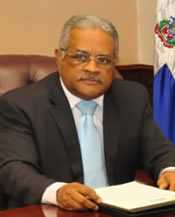 Vice minister of International Relations of the Ministry of Higher Education, Science and Technology (MESCyT in Spanish) of Dominican Republic
Vice minister of International Relations of the Ministry of Higher Education, Science and Technology (MESCyT in Spanish) of Dominican Republic
Dr. Sanchez-Cardenas earned his Doctor of Medicine from the Autonomous University of Santo Domingo (UASD in Spanish) in Dominican Republic, his Master in Sexual and Couples Therapy (INSAPEC), and his Master in Public Health (AIU).
Dr. Sanchez-Cardenas promotes the development of a system of alliances with states, higher education institutions, international agencies, and organizations that help make possible the educational development of higher education, science and technology in the Dominican Republic.
His experience includes serving as a high school professor, a doctor in public hospitals, professor of social and preventive medicine at the Iberoamerican University (UNIBE in Spanish), and as a public official.
Mariana McDonald, MPH, DrPH
 Dr. McDonald is Associate Director of Health Disparities and Director of the Office of Health Disparities in CDC’s National Center for Emerging and Zoonotic Diseases. She co-founded the CDC/ATSDR Latino/Hispanic Health Work Group (LHHWG) in 2012, and currently serves as its co-chair.
Dr. McDonald is Associate Director of Health Disparities and Director of the Office of Health Disparities in CDC’s National Center for Emerging and Zoonotic Diseases. She co-founded the CDC/ATSDR Latino/Hispanic Health Work Group (LHHWG) in 2012, and currently serves as its co-chair.
McDonald has worked in women’s and racial/ethnic minority health as a scientist, educator, and advocate for three decades. She received her DrPH and MPH from the UC Berkeley School of Public Health, and Masters in Women’s Studies from Goddard College. Formerly a professor of public health at Tulane University, her expertise includes social determinants of health, neglected infections, cultural and linguistic competence, Latino/a health, and women’s health promotion. A poet, McDonald also developed trailblazing work on using the arts in health promotion.
McDonald has provided leadership to numerous efforts to advance the health of women, people of color, and vulnerable populations since coming to CDC in 2002. She co-chaired the 2014 CDC seminar Immigrant, Migrant, and Foreign-born Health: Addressing Health Disparities, and envisioned and chaired the International Conference on Women and Infectious Diseases in 2004 and 2006. She was an invited speaker at the Institute of Medicine’s 2010 Workshop on Neglected Tropical Diseases (NTDS), presenting on NTDs’ global impact on women’s and children’s health. Bicultural/bilingual, she is a longtime member of the APHA’s Latino Caucus.
Her awards include CDC/ATSDR’s Health Equity Mentor/Champion Award and Award for Distinguished Service to the Greater New Orleans Latino Community. She is a member of Delta Omega, the National Public Health Honor Society.
Jo Valentine, MSW
 Jo A Valentine is the Associate Director for Health Equity in the Division of Sexually Transmitted Disease Prevention, Centers for Disease Control and Prevention. Beginning her career in public health as an AIDS prevention educator, counselor, and outreach worker in 1986, Ms. Valentine remains committed to health promotion, particularly for disadvantaged and underserved populations. With an emphasis on community engagement, partnership, and public health ethics, Ms. Valentine’s current duties and responsibilities include: 1) leading multi-disciplinary efforts to reduce STD disparities in the United States, 2) overseeing the Tuskegee Health Benefits Program, and 3) managing the Tuskegee University Bioethics Center project. She received her Bachelor’s Degree in Social Work from the University of Texas at Austin in 1982, and her Master’s Degree in Social Work in 1995 from the Clark Atlanta University School of Social Work.
Jo A Valentine is the Associate Director for Health Equity in the Division of Sexually Transmitted Disease Prevention, Centers for Disease Control and Prevention. Beginning her career in public health as an AIDS prevention educator, counselor, and outreach worker in 1986, Ms. Valentine remains committed to health promotion, particularly for disadvantaged and underserved populations. With an emphasis on community engagement, partnership, and public health ethics, Ms. Valentine’s current duties and responsibilities include: 1) leading multi-disciplinary efforts to reduce STD disparities in the United States, 2) overseeing the Tuskegee Health Benefits Program, and 3) managing the Tuskegee University Bioethics Center project. She received her Bachelor’s Degree in Social Work from the University of Texas at Austin in 1982, and her Master’s Degree in Social Work in 1995 from the Clark Atlanta University School of Social Work.
Maureen Y. Lichtveld, MD, MPH
 Maureen Lichtveld has 35 years experience in environmental public health and currently is Professor and Chair, Department of Global Environmental Health Sciences, Tulane University, School of Public Health and Tropical Medicine. She served as one of the highest ranking CDC environmental health scientists engaged in national environmental health research, and policy, often accompanied by congressional testimonies. During her 18 year CDC/ATSDR tenure Dr. Lichtveld engaged in designing research tools and protocols guiding national environmental health studies in communities living near hazardous waste sites nationwide and science-driven policies. The research tools and protocols were adopted by all states for their respective state-based environmental health programs.
Maureen Lichtveld has 35 years experience in environmental public health and currently is Professor and Chair, Department of Global Environmental Health Sciences, Tulane University, School of Public Health and Tropical Medicine. She served as one of the highest ranking CDC environmental health scientists engaged in national environmental health research, and policy, often accompanied by congressional testimonies. During her 18 year CDC/ATSDR tenure Dr. Lichtveld engaged in designing research tools and protocols guiding national environmental health studies in communities living near hazardous waste sites nationwide and science-driven policies. The research tools and protocols were adopted by all states for their respective state-based environmental health programs.
Her research uniquely integrates environmental health, health disparities, and disasters, with significant bridging expertise in community-based participatory research, women’s health, environmental policy, and health systems relevant to disaster preparedness, recovery and resilience. She is endowed chair in environmental policy and Associate Director, Population Sciences, Louisiana Cancer Research Consortium. As Director of the Center for Gulf Coast Environmental Health Research, Leadership, and Strategic Initiatives, her $29M research portfolio encompasses national and global environmental health including the first ever NIH (GEOHealth) award to Suriname, a lower middle income country in the Caribbean region, to examine the impact of dietary exposures to goldmining- and agriculturally- related contaminants on vulnerable pregnant women and infants.
Since 1988, she has served as IOM (NAM) consultant, is a member of US. EPA Scientific Advisory Board, the NAS IOM Roundtable on Environmental Health Sciences, Research, and Medicine, and member, Health Disparities Subcommittee, Advisory Committee to the Director CDC. She was elected Chair, Editorial Board, American Journal of Public Health and President, Hispanic Serving Health Professions Schools, leading the advancement of Hispanic health in collaboration with schools of medicine, public health, nursing, pharmacy, and dentistry. Dr. Lichtveld was honored as CDC’s Environmental Health Scientist of the Year and twice named Woman of the Year by the City of New Orleans for her contributions to science.
Marcela Gaitán, MPH, MA
 Ms. Gaitán is Senior Director for External Relations at The National Alliance for Hispanic Health in Washington, D.C. She serves as Project Director for a portfolio of initiatives at the Alliance including the Alliance/Merck Ciencia (Science) Hispanic Scholars Program, a partnership to improve Hispanic student access to higher education and degrees in science, technology, engineering and math (STEM). Ms. Gaitán also served as Project Director for Proyecto Informar, an initiative to improve access for Hispanic consumers to FDA information and health messages; Proyecto Ciencia® National Hispanic Outreach Initiative, an NIAID/NCMHD funded program that promoted the dissemination of information on innovative research opportunities for Hispanic scientists and students at multiple career levels; AoA/RTI funded Alzheimer’s outreach initiative that aimed to identify community models of service that successfully implemented culturally proficient programs for Hispanic/Latino elders with Alzheimer’s; and, the National Hispanic Leadership Network for Tobacco Control (The Network), a tobacco control program funded by the CDC that worked to establish a national Hispanic leadership movement for tobacco control grounded in community-based priorities and needs.
Ms. Gaitán is Senior Director for External Relations at The National Alliance for Hispanic Health in Washington, D.C. She serves as Project Director for a portfolio of initiatives at the Alliance including the Alliance/Merck Ciencia (Science) Hispanic Scholars Program, a partnership to improve Hispanic student access to higher education and degrees in science, technology, engineering and math (STEM). Ms. Gaitán also served as Project Director for Proyecto Informar, an initiative to improve access for Hispanic consumers to FDA information and health messages; Proyecto Ciencia® National Hispanic Outreach Initiative, an NIAID/NCMHD funded program that promoted the dissemination of information on innovative research opportunities for Hispanic scientists and students at multiple career levels; AoA/RTI funded Alzheimer’s outreach initiative that aimed to identify community models of service that successfully implemented culturally proficient programs for Hispanic/Latino elders with Alzheimer’s; and, the National Hispanic Leadership Network for Tobacco Control (The Network), a tobacco control program funded by the CDC that worked to establish a national Hispanic leadership movement for tobacco control grounded in community-based priorities and needs.
The Alliance is a source of information for the health of Hispanics in the United States. Alliance Hispanic community-based organization members provide services to more than 15 million people each year, making a daily difference in the lives of Hispanic communities and families. As SeniorDirector for External Relations, Ms. Gaitán advises the Alliance on national health and human services policy and leads efforts to create leadership networks to improve the health and well-being of Hispanic communities.Focused on its health mission, the Alliance refuses funding from tobacco and alcohol companies, their parent companies, and subsidiaries.
Before joining The Alliance, Ms. Gaitán was an Associate Consultant with the International Health Training Program at the Pan-American Health Organization (WHO/PAHO). Ms. Gaitán received her Bachelor’s Degree from Amherst College, in Amherst, MA; a Master’s Degree in Latin American Studies from The American University in Washington, DC, and a Master’s Degree in Public Health from George Washington University also in Washington, DC.
Nixon Ricardo Arauz
 Nixon is an ORISE Fellow at the Office of Health Equity (OHE), in the Division of STD Prevention. Nixon’s project is to provide critical support to enhance and expand STD prevention services to adolescents and young adults within the Hispanic/Latino communities by building health promotion, partnerships with National and local organizations. Prior to joining the CDC Nixon worked as a junior business operations analyst for a small health care service company in New York City, as well as the student ambassador membership coordinator for the New York City Hispanic Chamber of Commerce. Nixon holds a M.A. in Public Health Education Promotion from Columbia University, a B.S. in Biology Society, with Minors in Global Health, Latino Studies from Cornell University.
Nixon is an ORISE Fellow at the Office of Health Equity (OHE), in the Division of STD Prevention. Nixon’s project is to provide critical support to enhance and expand STD prevention services to adolescents and young adults within the Hispanic/Latino communities by building health promotion, partnerships with National and local organizations. Prior to joining the CDC Nixon worked as a junior business operations analyst for a small health care service company in New York City, as well as the student ambassador membership coordinator for the New York City Hispanic Chamber of Commerce. Nixon holds a M.A. in Public Health Education Promotion from Columbia University, a B.S. in Biology Society, with Minors in Global Health, Latino Studies from Cornell University.
Karen Bouye, PhD, MPH, MS
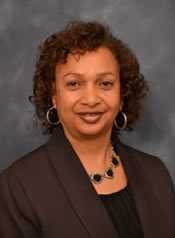 Dr. Karen Bouye is the Senior Advisor for Research/Health Scientist at the Centers for Disease Control and Prevention (CDC) in the Office of Minority Health and Health Equity. In her role at the CDC, she serves in the planning, designing and coordination of various research and evaluation projects related to health disparities and health equity among racial/ethnic minority population groups. She has worked on the Affected/Vulnerable Populations Team in the CDC Emergency Operations Center for the past four years as well as the Pandemic Influenza Workgroup for Vulnerable Populations. Dr. Bouye has over 25 years of experience in the public health field.
Dr. Karen Bouye is the Senior Advisor for Research/Health Scientist at the Centers for Disease Control and Prevention (CDC) in the Office of Minority Health and Health Equity. In her role at the CDC, she serves in the planning, designing and coordination of various research and evaluation projects related to health disparities and health equity among racial/ethnic minority population groups. She has worked on the Affected/Vulnerable Populations Team in the CDC Emergency Operations Center for the past four years as well as the Pandemic Influenza Workgroup for Vulnerable Populations. Dr. Bouye has over 25 years of experience in the public health field.
She received her undergraduate degree from Tennessee State University, a Masters Degree in Public Health at Emory University; as well as a Masters of Science and Doctor of Philosophy at the Ohio State University.
Julio Dicent Taillepierre, MS
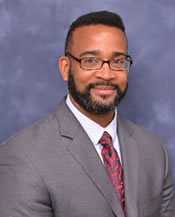 Julio is the team leader for the Initiatives and Partnerships Unit of the CDC office of Minority Health and Health Equity. In this capacity, he provides technical leadership for the agency on the development of health equity program development efforts and agency language access capacity building initiatives. He also oversees several agency-wide initiatives related to national public health pipeline programs, public communication efforts, and bi-national health equity collaborations with Brazil.
Julio is the team leader for the Initiatives and Partnerships Unit of the CDC office of Minority Health and Health Equity. In this capacity, he provides technical leadership for the agency on the development of health equity program development efforts and agency language access capacity building initiatives. He also oversees several agency-wide initiatives related to national public health pipeline programs, public communication efforts, and bi-national health equity collaborations with Brazil.
Prior to his current role, Julio was a Public Health Analyst at the CDC National Center for HIV/AIDS, Viral Hepatitis, STD, and TB Prevention – Division of HIV and AIDS Prevention. In this capacity he was the Branch lead for HIV Prevention Community Planning activities, and the lead for HIV capacity building efforts targeted to Hispanic-serving community-based organizations. He oversaw national HIV awareness campaigns targeted to men who have sex with men, migrant farmworker populations and Hispanic/Latinos.
Prior to joining the CDC, he was the Research Coordinator for the Star Center at the State University of New York (SUNY) Downstate Medical Center, overseeing a national longitudinal study on the potential impact of changes in welfare legislation on Hispanic/Latina's prenatal and postpartum health. He has also served as an organizational development consultant for nonprofit organizations in the US and Latin America; and as Director of Care Services for an HIV prevention and care program targeted to immigrant populations in New York City.
Mr. Dicent Taillepierre has a Master’s Degree in Non Profit Management and Policy Analysis from the New School University in New York City and a Liberal Arts degree from Hampshire College in Massachusetts.
Craig S. Wilkins, MPH
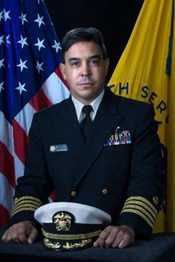 CAPT Craig S. Wilkins, MPH, on a temporary assignment from the Office for State, Tribal, Local and Territorial Support (OSTLTS) as a Senior Advisor to work on several priority activities that will advance the missions of OMMHE and OSTLTS.
CAPT Craig S. Wilkins, MPH, on a temporary assignment from the Office for State, Tribal, Local and Territorial Support (OSTLTS) as a Senior Advisor to work on several priority activities that will advance the missions of OMMHE and OSTLTS.
His work includes collaborative activities that support health equity initiatives and advancing the social determinants of health through leadership training; strategic planning activities to ensure that the needs of STLT departments of health are addressed, and assessing how current OMHHE goals and initiatives can be leveraged to increase integration of health equity in the portfolios of OSTLTS’s partners through capacity building.
Prior to joining OMHHE on this assignment, Wilkins served as Acting Associate Director for Tribal Support in OSTLTS. In this role he served as CDC’s principal advisor to and main liaison with policy-level officials regarding American Indian/Alaska Natives (AI/AN), the contact for tribal inquires, and the intradepartmental coordinator of CDC/ATSDR programs and policies that affect AI/AN populations.
Wilkins has more than 25 years’ combined federal service with the Indian Health Service and CDC. Before joining CDC in 1997, he served several tours of duty with the Indian Health Service in Utah, Wyoming, and Montana. In addition, Wilkins has served overseas in assignments in India, Bangladesh, Nigeria, Zimbabwe, Guinea, also including a deployment to Haiti as CDC’s liaison officer for post hurricane recovery efforts as part of Operation Unified Response.
Eva de Vallescar
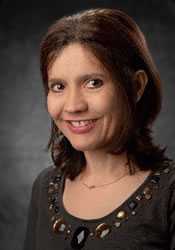 Eva de Vallescar is a Health Communication Specialist with the Office of Minority Health and Health Equity (OMHHE), Office of the Director. In that position, she facilitates internal and external communication of management and different teams, and edits the quarterly e-newsletter, Health Equity Matters. Previously she worked as a translator and linguist with CDC's Multilingual Services (MLS).
Eva de Vallescar is a Health Communication Specialist with the Office of Minority Health and Health Equity (OMHHE), Office of the Director. In that position, she facilitates internal and external communication of management and different teams, and edits the quarterly e-newsletter, Health Equity Matters. Previously she worked as a translator and linguist with CDC's Multilingual Services (MLS).
Before joining CDC, she served as the editor of the Atlanta based Spanish weekly Mundo Hispánico. Eva has more than 20 years of experience in the field of communications, including writer and producer for CNN en Español, print, and Web media. She received a degree in Communications from the Universidad Iberoamericana (Mexico City) and a Master’s Degree in Medical Translation from Universidad Jaume I (Valencia, Spain). Last year she was part of CDC Ebola Response in West Africa, where she worked with the Health Promotion team.
Joan Harrell, DMIN, MDIV, MS
 The Reverend Doctor Joan Harrell (@DrJoanRHarrell) is an ordained American Baptist clergywoman, public health communications ethicist and award winning broadcast journalist and documentary producer. She is a graduate of Stephens College in Columbia, MO, the Interdenominational Theological Center in Atlanta, Columbia University Graduate School of Journalism in New York City, recipient of the Schuman Post Graduate Fellow at the Columbia University Graduate School of Journalism and she completed her doctoral work in public theology at the Chicago Theological Seminary.
The Reverend Doctor Joan Harrell (@DrJoanRHarrell) is an ordained American Baptist clergywoman, public health communications ethicist and award winning broadcast journalist and documentary producer. She is a graduate of Stephens College in Columbia, MO, the Interdenominational Theological Center in Atlanta, Columbia University Graduate School of Journalism in New York City, recipient of the Schuman Post Graduate Fellow at the Columbia University Graduate School of Journalism and she completed her doctoral work in public theology at the Chicago Theological Seminary.
Dr. Harrell is the Associate Director of the Community Engagement Core and Visiting Scholar at the National Center for Bioethics in Research and Health Care (National Bioethics Center) at Tuskegee University. She is also the Senior Associate Editor of The Journal of Healthcare, Science and The Humanities and originator and content developer of the National Bioethics Center’s Web 2.0 which includes the National Bioethics Center’s mobile app and www.tuskegeebioethics.org. Her research for the National Bioethics Center which explores how “the critical nature of the public health communications network” that was instituted during National Negro Health Week by Booker T. Washington and his colleagues in 1915, created an academic opportunity for her to work with Dr. Rueben Warren, Professor and Director of the National Bioethics Center to establish an annual Public Health Ethics Symposium at the Center for Disease Control and Prevention (CDC) during Minority Health Month. The first forum in 2015 focused on the health disparities of African Americans and was titled, “National Negro Health Week to National Minority Health Month: 100 Years of Moving Public Health Forward.” The forum in April 2016 will concentrate on the Hispanic/Latino population, the theme is “Making it Count: Advancing a Public Health Ethics Framework on Data Collection for Social Justice.” In 2017 the Public Health Ethics Symposium will deliberate the health challenges in the Native American population and the 2018 Public Health Ethics Symposium will concentrate on disparities experienced by Asian Americans. Each year this forum is offered for in-house participation at the CDC and virtual participation via the internet. Joan’s scholarship investigation at the National Bioethics Center also includes the National Negro Health Movement and the intersection of media, social media, bioethics, racism, race-based medicine, religion and the phenomenology of public health injustices negatively impacting women, communities of color and impoverished populations.
Gemechu B. Gerbi, PhD, MSc
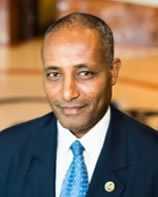 Dr. Gerbi earned his B.A. in Sociology and Social Administration from Addis Ababa University, Addis Ababa, Ethiopia. He earned his M.Sc. in Epidemiology/Veterinary Science, and Ph.D. in Integrative Biosciences/Epidemiology from Tuskegee University, Tuskegee, Alabama. Dr. Gerbi was an assistant professor at Tuskegee University from 2009-2012 where he taught courses (Epidemiology, Biomedical Statistics/ Biostatistics and Risk Analysis) to graduate students.
Dr. Gerbi earned his B.A. in Sociology and Social Administration from Addis Ababa University, Addis Ababa, Ethiopia. He earned his M.Sc. in Epidemiology/Veterinary Science, and Ph.D. in Integrative Biosciences/Epidemiology from Tuskegee University, Tuskegee, Alabama. Dr. Gerbi was an assistant professor at Tuskegee University from 2009-2012 where he taught courses (Epidemiology, Biomedical Statistics/ Biostatistics and Risk Analysis) to graduate students.
Dr. Gerbi is currently an Assistant Professor of Epidemiology and Biostatistics in the Department of Community Health and Prevention Medicine at Morehouse School of Medicine (MSM). At MSM, Dr. Gerbi also serves as core faculty and Director of Public Health Research in the Master of Public Health (MPH) Program. His areas of public health interest are the epidemiologic and social determinants of viral hepatitis, HIV/AIDS, cancer, cardiovascular diseases, and diabetes.
In addition to his academic preparation and experience teaching graduate students, Dr. Gerbi brings to the MSM Master of Public Health Program practical experience as an Epidemic Intelligence Officer (EIS) officer in the Epidemiology and Surveillance Branch, Division of Viral Hepatitis, National Center for HIV/AIDS, Viral Hepatitis, STD, and TB Prevention, Centers for Disease Control and Prevention. As an EIS officer, he conducted field investigations of potentially serious public health problems which required a timely response at national and international levels. For example, in 2012, as a member of CDC’s outbreak investigation and response team, he assisted the United Nations High Commissioner for Refugees (UNHCR) with a Hepatitis E outbreak investigation in Maban County refugee camps, Upper Nile State, South Sudan. In 2013, he was also assigned and deployed to the Middle East Respiratory Syndrome Coronavirus (MERS-CoV) Domestic Surveillance Team for MERs outbreak response. Additionally, as an EIS officer, Dr. Gerbi provided epidemiological expertise to public health officials in several states, the US Food and Drug Administration, and to CDC colleagues to investigate a multi-state outbreak of hepatitis A virus infections linked to pomegranate seeds from Turkey. Dr. Gerbi has also published various scientific manuscripts in peer-reviewed journals.
Stephanie Miles-Richardson DVM, PhD
 Stephanie Miles-Richardson, is Associate Professor in the Department of Community Health and Preventive Medicine, Assistant Dean for Graduate Education in Public Health, and Director of the Master of Public Health Program at Morehouse School of Medicine (MSM). She joined the faculty at MSM after over a decade of federal service at the Centers for Disease Control and Prevention (CDC) and the Agency for Toxic Substances and Disease Registry (ATSDR) where she held several positions including Toxicologist and Scientific Technical Advisor for a $4 million environmental toxicology research program at ATSDR, and Associate Director for Minority Health and Health Disparities Policy at CDC. At MSM, Dr. Miles-Richardson is the Training Core Lead for the Comprehensive Cancer Center partnership between MSM, Tuskegee University and the University of Alabama-Birmingham and she is a co-investigator on the Cancer Prevention and Control Research Curriculum grant funded by the National Cancer Institute. Her research interests are focused on understanding the relationship between state legislation and resource allocation which supports breast cancer screening thereby reducing breast cancer mortality, particularly in underserved communities. Additional research interest is focused on characterizing environmental exposures which contribute to breast and cervical cancer in underserved populations, and the relationship between environmental policy and environmental contributors in those populations.
Stephanie Miles-Richardson, is Associate Professor in the Department of Community Health and Preventive Medicine, Assistant Dean for Graduate Education in Public Health, and Director of the Master of Public Health Program at Morehouse School of Medicine (MSM). She joined the faculty at MSM after over a decade of federal service at the Centers for Disease Control and Prevention (CDC) and the Agency for Toxic Substances and Disease Registry (ATSDR) where she held several positions including Toxicologist and Scientific Technical Advisor for a $4 million environmental toxicology research program at ATSDR, and Associate Director for Minority Health and Health Disparities Policy at CDC. At MSM, Dr. Miles-Richardson is the Training Core Lead for the Comprehensive Cancer Center partnership between MSM, Tuskegee University and the University of Alabama-Birmingham and she is a co-investigator on the Cancer Prevention and Control Research Curriculum grant funded by the National Cancer Institute. Her research interests are focused on understanding the relationship between state legislation and resource allocation which supports breast cancer screening thereby reducing breast cancer mortality, particularly in underserved communities. Additional research interest is focused on characterizing environmental exposures which contribute to breast and cervical cancer in underserved populations, and the relationship between environmental policy and environmental contributors in those populations.
Dr. Miles-Richardson received a Bachelor of Science (BS) in Biology from Grambling State University, a Doctor of Veterinary Medicine (DVM) degree from Tuskegee School of Veterinary Medicine, and a dual PhD in Pathology and Environmental Toxicology from Michigan State University. She is married to Burnell Richardson, MT (ASCP) and they have three children, Brandon, Dhara, and Bryce.
Elena V. Rios, MD, MSPH
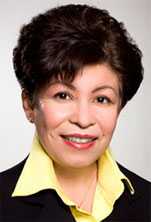 President & CEO, National Hispanic Medical Association
President & CEO, National Hispanic Medical Association
President, National Hispanic Health Foundation
Dr. Rios serves as President & CEO of the National Hispanic Medical Association, (NHMA), representing Hispanic physicians in the United States. The mission of the organization is to improve the health of Hispanics. Dr. Rios also serves as President of NHMA's National Hispanic Health Foundation affiliated with the Robert F. Wagner Graduate School of Public Service, New York University, to direct educational and research activities.
Dr. Rios also serves on the National Hispanic Leadership Agenda, Campaign Against Obesity, Care First Blue Cross Blue Shield, Commission to End Health Disparities, and the Nurse Family Partnership Boards of Directors; and the GE Healthcare Developing Health Access Advisory Board and the U.S. Office of Personnel Management Hispanic Hiring Task Force. Dr. Rios previously served on the California PacifiCare-United Healthcare California Investment Committee and the Partnerships for Prevention Board of Directors. Dr. Rios has lectured and published articles and has received several leadership awards, including the 2009 Top 100 Influential and Innovative Hispanics from Hispanic Business Magazine. Dr. Rios has been honored by U.S. Department of Health and Human Services, Congressional Black, Hispanic, Asian and Native American Caucuses, American Public Health Association Latino Caucus, Association of Hispanic Health Executives, Minority Health Month, Inc., Hispanic Magazine, Verizon's First Pollin Community Service Award, and Amerimed. In 2006, Dr. Rios was appointed to the Minority Alumni Hall of Fame of Stanford University and in 2008, was appointed as a Fellow to the New York Academy of Medicine in 2007.
Prior to her current positions, Dr. Rios served as the Advisor for Regional and Minority Women's Health at the U.S. Department of Health and Human Services Office on Women's Health from November 1994 to October 1998. In 1993, Dr. Rios served as the National Health Care Reform Task Force Coordinator of Outreach Groups at White House. In 1992, Dr. Rios worked for the State of California Office of Statewide Health Planning and Development as a policy researcher. Dr. Rios has also served as President, Chicano/Latino Medical Association of California, founder of the National Network of Latin American Medical Students (now called LMSA), member of the California Department of Health Services Cultural Competency Task Force, Stanford Alumni Association and Women's Policy Inc. Boards of Directors, and the American Medical Association's first Minority Affairs Consortium Steering Committee.
Dr. Rios earned her BA in Human Biology/Public Administration at Stanford University in 1977, MSPH at the University of California, Los Angeles (UCLA) School of Public Health in 1980, her MD at the UCLA School of Medicine in 1987, completed her Internal Medicine residency at the Santa Clara Valley Medical Center in San Jose and the White Memorial Medical Center in East Los Angeles in 1990, and her NRSA Primary Care Research Fellowship at UCLA Division of General Internal Medicine in 1992. Rios was presented with the honorary Doctor of Science by Lehman College in 2010.
- Page last reviewed: March 29, 2016
- Page last updated: March 29, 2016
- Content source:


 ShareCompartir
ShareCompartir